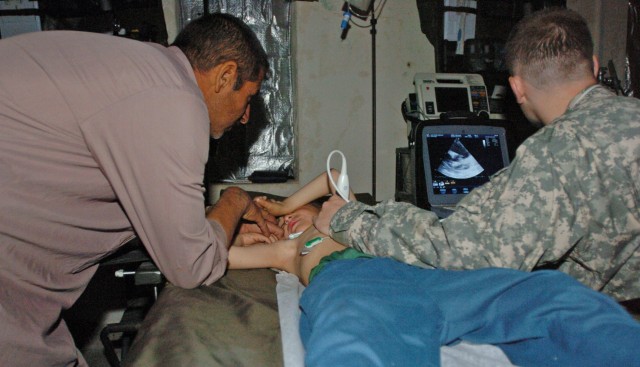
AL TINA, Iraq (Army News Service, May 31, 2007) - There are certain expectations of U.S. Soldiers going "outside the wire" to conduct humanitarian missions in villages around their military bases. Saving a boy with a heart defect is generally not one of those expectations.
A medical team from the 82nd Field Artillery Regiment's 5th Battalion has taken the rare opportunity to help eight-year-old Mahmood Amer Hamad.
"When I came here, the prior battalion surgeon had found out about this boy," said Capt. Abel Alfonso, battalion surgeon. "He had tried to get Mahmood examined in Mosul, but they didn't have the proper equipment there. That's when I came in and made the arrangements to have cardiologists come here to see the boy."
While the boy's situation was first discovered about ten months ago by the 37th Field Artillery Regiment's 1st Battalion, the 82nd FAR's 5th Bn. has taken up the cause to get Mahmood life-saving medical attention.
"The American Soldiers came to our village, and I told them about my son," said Amer Hamad Randan, Mahmood's father. "I asked them to help Mahmood, and they told me they would help."
Capt. Alfonso contacted Maj. Todd Villines, a cardiologist, and Maj. Ted Koutlas, a cardiac surgeon, both with 399th Combat Surgical Hospital at Contingency Operating Base Speicher. They flew to Forward Operating Base Qyayyarah with a portable echocardiogram machine to examine Mahmood and determine the severity of Mahmood's heart defect May 28.
"Mahmood has a ventricle sepal defect, which is an abnormal connection between the right and left ventricles of the heart," Maj. Villines said. "It's like a leak from one side of the heart to the other that puts a strain on the right ventricle. If left uncorrected, it would likely over time lead to permanent heart damage, then heart failure and early death."
Catching and correcting the defect early improves Mahmood's chance of leading a normal life.
"That's what is so gratifying about coming here and treating this little guy. We can really make an impact on his future," said Maj. Villenes.
Now that tests have shown the exact size and location of the hole in Mahmood's heart, they believe he is a perfect candidate for corrective surgery.
"He doesn't have severe enlargement of his heart or severe heart damage, he's fairly young, and he's at a stage where we can correct this and it'll improve how his heart works now," Maj. Villines said.
With surgery next, Capt. Alfonso is worried about funding the procedure, as well as the costs associated with travel and accommodations. One option is to send Mahmood to Amman, Jordon, which would cost approximately $10,000. Another option is to send Mahmood to the United States.
"I do probably about 12 to 15 charity cases a year back home, and I'd certainly be glad to operate on him," Maj. Koutlas said. "We work with a program called Samaritan's Purse, and it sponsors kids from different countries. I've operated on kids from Mongolia, Bosnia and Honduras. I'm sure they'd be willing to help us operate on Mahmood."
While ideal, this option presents its own challenges. The costs of the treatment itself would be taken care of, but there is still the matter of funding the plane tickets for Mahmood and a guardian, as well as determining who would make the trip with the boy, and who would care for his nine brothers and sisters still in Iraq.
Despite the logistical obstacles, the 5th Bn., 82nd FAR medical team is optimistic and determined to bring about a positive outcome for the child.
"There are lots of kids out there who need help," Capt. Alfonso said. "We can't save the world, but we can make a difference in the life of one kid, and that makes it all worthwhile."
(Spc. Amanda Morrissey writes for the 5th Mobile Public Affairs Detachment.)

Social Sharing